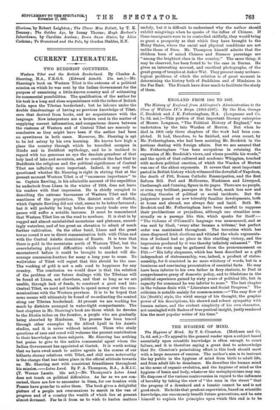CURRENT LITERATURE.
TWO BUDDHIST COUNTRIES.
Western Tibet and the British Borderland. By Charles A. Sherring, M.A., F.R.G.S. (Edward Arnold. 21e. net.)—Mr. Sherring's book on Western Tibet is the outcome of a political mission on which he was sent by the Indian Government for the purpose of examining a little-known country and of estimating its commercial possibilities. The qualification of the author for his task is a long and close acquaintance with the tribes of British India upon the Tibetan borderland ; but he labours under the double disadvantage of having no previous knowledge of Tibet, save that derived from books, and no acquaintance with the language. Now interpreters are a broken reed in the matter of supplying correct information, and comparisons drawn between the customs of Western and of Central Tibet are scarcely so conclusive as they might have been if the author bad been an eyewitness in both cases. Moreover, Mr. Sherring is apt to be led astray by his own learning. He knows how high a place the country through which ho travelled occupies in Hindu and in Buddhist mythology, and he is inclined to regard with too generous an eye the desolate grandeur of that holy land of lake and mountain, and to overlook the fact that to Buddhists the religious and the political significance of Central Tibet are infinitely more important. Indeed, it may well be questioned whether Mr. Sherring is right in stating that at the present moment Western Tibet is of "enormous importance" to us. Captain Bawling, in his admirable account of the expedition he undertook from Lhasa in the winter of 1904, does not leave his readers with that impression. He is chiefly occupied in describing the extreme barrenness of Western Tibet and the scantiness of the population. The district south of Gartok, which Captain Bawling did not visit, seems to be better favoured ; but it will probably be long before the yearly trade over the passes will suffer a notable increase. It must be remembered that Western Tibet lies on the road to nowhere. It is shut in by rugged and almost uninhabited mountains and plateaux, exceed- ingly waterless, and of too great an elevation to admit of much further cultivation. On the other hand, Lhasa and the great towns round it are in direct communication both with China and with the Central Asiatic dominions of Russia. It is true that there is gold in the mountains north of Western Tibet, but the overwhelming physical difficulties which would have to be encountered before it could be brought to market will dis- courage concession-hunters for many a long year to come. No wellwisher of Tibet will regret that this should be the case. The working of gold is not a safe road to happiness for any country. The conclusion we would draw is that the solution of the problem of our future dealings with the Tibetans will be found at Lhasa, not elsewhere, and that so long as we are unable, through lack of funds, to construct a good road into Central Tibet, we need not trouble to spend money over the com- munications with the Western province. It is to be hoped that some means will ultimately be found of co-ordinating the control along our Tibetan borderland. At present we are working too much by districts arranged in water-tight compartments. The best chapters in Mr. Sherring's book are those which he devotes to the Bhotia tribes on the frontier, a people who are gradually being absorbed by Hinduism. The process has been traced through other examples by Sir Alfred Lyall in his Asiatic studies, and it is never without interest. Those who study questions of race and creed will welcome the present contribution to their knowledge on these subjects. Mr. Sherring has nothing but praise to give to the native commercial agent whom the Indian Government has appointed at Gartok. It is worth noting that we have owed much to native agents in the course of our hitherto stormy relations with Tibet, and still more noteworthy is the change that has taken place in the official attitude towards us. Mr. Sherring met with consistent friendliness throughout his mission.—Lotus Land. By P. A. Thompson, B.A., A.M.I.C. (T. Werner Laurie. 16s. net.)—Mr. Thompson's Lotus Land does not touch on political difficulties. As far as we are con- cerned, there are few to encounter in Siam, for our treaties with France have gone far to solve them. The book gives a delightful picture of a people not over-anxious to march in the van of progress and of a country the wealth of which lies at present almost dormant. Far be it from us to wish to hasten matters unduly, but it is difficult to understand why the author should exhibit misgivings when he speaks of the influx of Chinese. If these immigrants were to be controlled skilfully, they would bring as great a prosperity as that which they have brought to the Malay States, where the racial and physical conditions are not unlike those of Siam. Mr. Thompson himself admits that the children born of mixed Chinese and Siamese parentage are "among the brightest class in the country." The same thing, it may be observed, has been found to be the case in Burma. He gives an interesting account, and excellent photographs, of the great group of temples at Ankor Wat. They present many archaeo- logical problems of which the solution is of great moment in determining the history both of Buddhism and of Hinduism in the Far East. The French have done much to facilitate the study of them.


























































 Previous page
Previous page